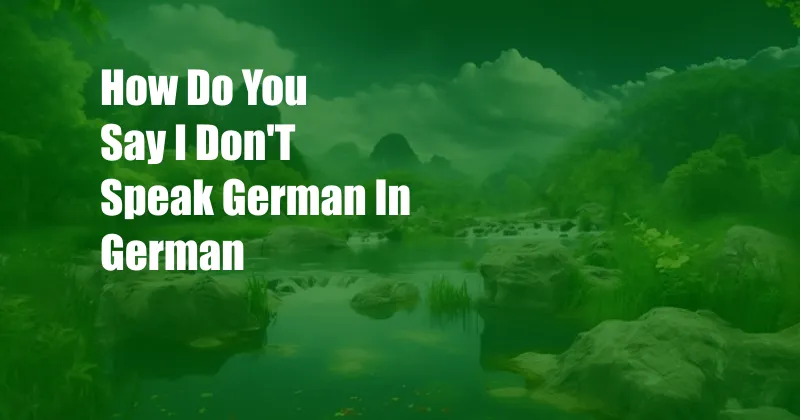
How to Politely Say “I Don’t Speak German” in German
Imagine yourself in the heart of Berlin, surrounded by the bustling energy of the city. As you navigate the vibrant streets, eager to explore the rich history and culture, you realize that your German language skills are…well, let’s just say they need a little improvement. But don’t worry, you’re not alone! Many visitors to Germany find themselves in similar situations. The key is to approach the language barrier with a smile and a respectful attitude.
To help you navigate this linguistic adventure, we’ve compiled a comprehensive guide on how to politely decline a German conversation when your vocabulary falls short. From the most straightforward phrases to more nuanced expressions, we’ve got you covered. So, let’s dive into the world of German etiquette and learn the art of saying “I don’t speak German” with confidence.
Ich spreche kein Deutsch
The most direct way to convey your lack of German proficiency is with the phrase “Ich spreche kein Deutsch.” Pronounced as “ikh shprek-eh kyne doych,” this simple sentence clearly communicates your linguistic limitations. While it may seem abrupt, it’s a commonly understood expression that should get the message across effectively.
Entschuldigung, ich spreche kein Deutsch
If you’re looking to add a touch of politeness to your response, consider using “Entschuldigung, ich spreche kein Deutsch.” Translated as “Excuse me, I don’t speak German,” this phrase conveys a sense of apology for your inability to communicate. The addition of “Entschuldigung” (excuse me) softens the tone and shows that you’re aware of the inconvenience your lack of German may cause.
Leider spreche ich kein Deutsch
For a slightly more formal approach, “Leider spreche ich kein Deutsch” is a suitable choice. Meaning “Unfortunately, I don’t speak German,” this phrase expresses your regret at not being able to engage in a German conversation. It’s particularly appropriate in situations where you might expect someone to speak English, such as in a business or tourist setting.
Ich verstehe kein Deutsch
If you’re struggling to keep up with a German conversation, “Ich verstehe kein Deutsch” can be a useful phrase. Translated as “I don’t understand German,” it allows you to politely indicate that you’re not comprehending the language being spoken. This expression is especially helpful when you’re trying to follow a conversation or ask someone to speak more slowly.
Könnten Sie bitte Englisch sprechen?
To take the conversation a step further, you can politely inquire if the person you’re speaking to is able to communicate in English. Using the phrase “Könnten Sie bitte Englisch sprechen?” (Could you please speak English?), you can express your desire to continue the conversation in a language you’re more comfortable with. This request is particularly useful in situations where you need to convey important information or ask for assistance.
Tips and Expert Advice for Navigating Language Barriers
In addition to the phrases we’ve covered, here are some additional tips and expert advice to help you navigate language barriers with confidence:
- Smile and be friendly: A warm smile and a friendly demeanor can go a long way in breaking down language barriers. People are more likely to be patient and understanding if they see that you’re making an effort to communicate.
- Use body language: Nonverbal cues can be surprisingly effective in conveying messages. Use gestures, facial expressions, and body language to emphasize your words and make your intentions clear.
- Be patient: Don’t get discouraged if you don’t understand everything right away. Be patient with yourself and with the person you’re speaking to. Communication is a two-way street, and it takes time to build understanding.
- Don’t be afraid to ask for help: If you’re really struggling to communicate, don’t hesitate to ask for help. There are many people in Germany who are willing to help visitors overcome language barriers.
FAQ on Saying “I Don’t Speak German” in German
To address some common questions related to this topic, here’s a brief FAQ:
- Q: Is it considered rude to say “I don’t speak German” in German?
A: No, it’s not rude to say “Ich spreche kein Deutsch” in German. It’s a commonly understood expression that simply conveys your lack of German proficiency. - Q: What’s the best way to apologize for not speaking German?
A: The phrase “Entschuldigung, ich spreche kein Deutsch” is a polite way to apologize for not being able to speak German. - Q: Can I use Google Translate to help me communicate?
A: While Google Translate can be a helpful tool in certain situations, it’s important to use it with caution. Machine translations can sometimes be inaccurate or awkward, so it’s best to use them as a supplement to your own communication efforts.
Conclusion
Learning how to say “I don’t speak German” in German is an essential phrase for any traveler or visitor to the country. By using the phrases and tips we’ve provided, you can politely and effectively communicate your language limitations. Remember to approach conversations with a smile and a positive attitude, and don’t be afraid to ask for help when needed. With a little effort, you can successfully navigate language barriers and make the most of your time in Germany.
So, are you ready to embrace the beauty of German culture without letting language hold you back? Grab a phrasebook, practice your pronunciation, and get ready to explore the wonders of Germany with confidence!